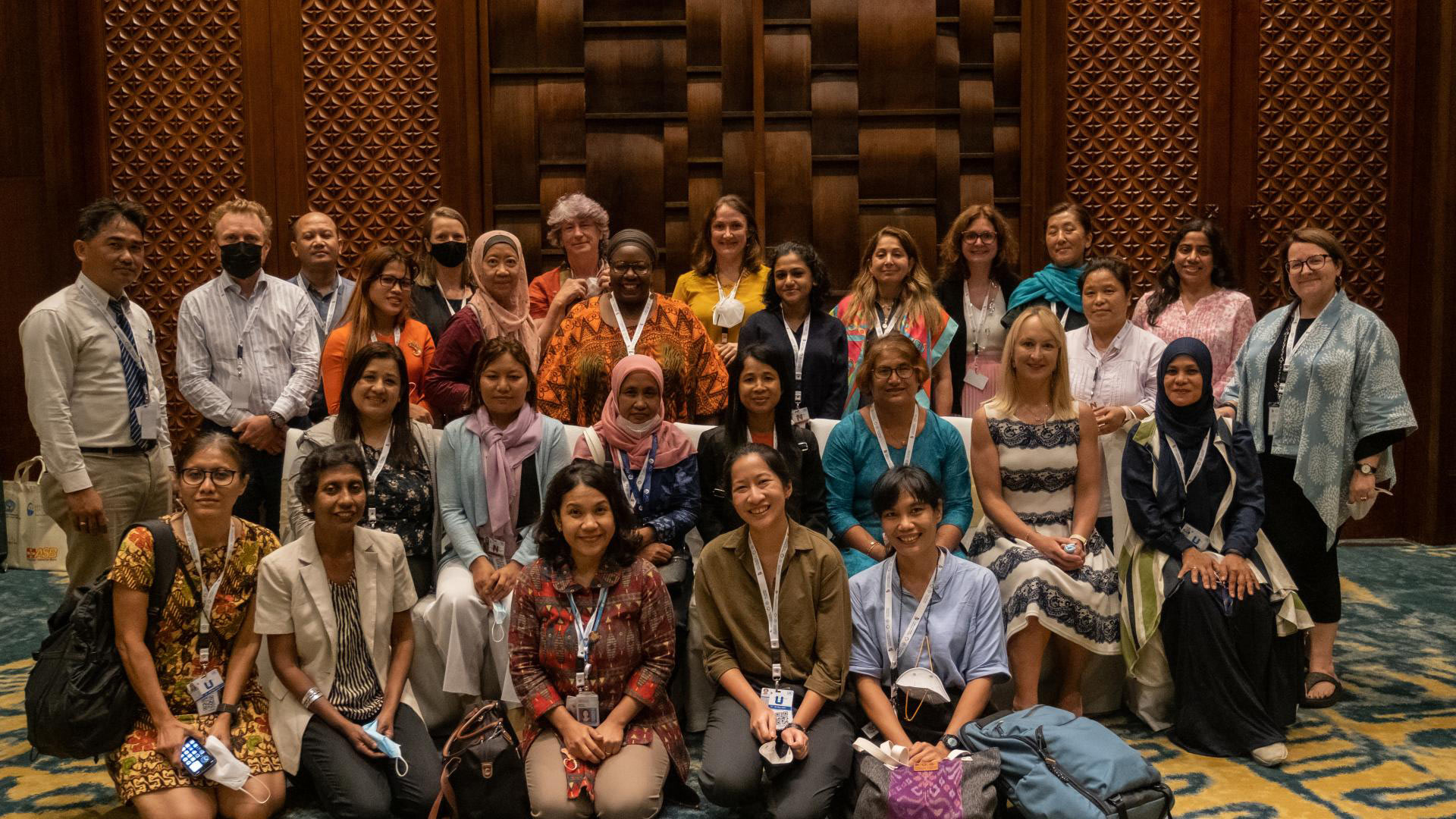Gender champions share insights on women’s leadership and gender equality in disaster risk reduction
UN Women, in partnership with the Australian Government, organised the first in-person gender champion and gender expert meeting, during the 7th Global Platform for Disaster Risk Reduction

[Geneva, July 2022] In May 2022, governments, United Nations entities, international organisations and civil society representatives convened for the 7th Global Platform for Disaster Risk Reduction (GPDRR2022), the Third Multi-Hazard Early Warning Conference (MHEWC-III) and the Fifth World Reconstruction Conference (WRC 5) to assess and discuss progress on the implementation of the Sendai Framework for Disaster Risk Reduction 2015-2030. The agenda was based on the Sendai Framework priority actions and targets, in the context of a COVID-19 transformed world and the ongoing Midterm review of the Sendai Framework scheduled for completion in 2023.
“The ongoing Sendai Framework mid-term review is a critical opportunity to address gender gaps in disaster risk reduction and resilience. We need to strategically incorporate gender dimensions into the review process to identify and address the causes of gender-specific disaster impacts. We also need to leverage women’s voice, agency and leadership for disaster and climate resilience”. Under-Secretary-General of the United Nations and Executive Director of UN Women, Sima Bahous’ official statement at GPDR2022.
UN Women used the Global Platform as an opportunity to secure significant progress for gender equality and women’s leadership in disaster risk reduction and resilience. UN Women worked to advance the gender-responsive implementation of the Sendai Framework, contributing to the gender mainstreaming across of all three conference outcome statements by leveraging the agreed conclusions of the Commission on the Status of Women (CSW66), drawing upon UN Women’s key DRR gender messages to provide technical support for gender inclusion in the drafting of the outcome statements, and organising and engendering 14 sessions at the three conferences.
UN Women, together with the Australian Government, provided a platform for grassroot gender stakeholders participating in-person at the Global Platform. Mr Jason Andean, Director of Policy and Ministerial Engagement, DRR Taskforce, at the Australian Department of Foreign Affairs and Trade (DFAT), inaugurated the meeting by highlighting “the powerful role of women’s leadership at all levels, for integrated response to disasters” and recognised that “women and girls are community leaders, first responders and agents of change.” Over 50 gender champions and experts, including the Women’s Resilience to Disasters Experts, were invited to share their experiences and join the growing gender-responsive DRR community.
“To be effective, climate change and disaster risk reduction must be inclusive”. Mr Jason Andean, Director of Policy and Ministerial Engagement, DRR Taskforce, at the Australian Department of Foreign Affairs and Trade (DFAT).
Participants from more than 15 countries shared their engagements and key reflections during a two-hour networking gathering. Representatives of a disability association from Nepal noted that “‘Leave no one behind’ should be framed from an intersectional and cultural prism, and should be gender-responsive”. They highlighted that their commitments were to “respect the diversity of all women and girls – including LGBTIQ+ people and [those living in] rural areas.” They also emphasised that “[grassroot CSOs] do have the best practices” further noting that “We know what we need to do. It is time to generate evidence and look at the best practices from the grassroots level, and for that, meaningful participation is required.”
“We do have the best practices – we know what we need to do. It is time to generate evidence and look at the best practices from the grassroots level, and for that, meaningful participation is required.” Representatives of an association for people with disabilities in Nepal.
Practitioners from the Huairou Commission, an international women-led social movement of grassroots women's groups from poor urban, rural, and indigenous communities, emphasised the need for a “bottom-up approach.” They noted that “the [Sendai Framework] Midterm Review needs to take cognisant of women’s leadership and engagement of monitoring of results as they are the ones that are implementing the Sendai Framework on the ground in their daily lives.”
"[Women] are the ones that are implementing the Sendai Framework on the ground in their daily lives." Huairou Commission member.
Ms Sharon Bhagwan Rolls, the Shifting the Power Coalition regional representative for the Pacific, stressed that there is an “opportunity to learn from the way in which, we, as women in Asia and the Pacific, and across the globe, we are organising and bringing movements together”. Her colleague, Ms Carolyn Kitione a youth representative, informed the participants that more young women from the climate change movement, supported by DFAT, will be attending the Asia-Pacific Ministerial Conference for DRR with her in September 2022.
Ms Liza Hernandez., Global Network of CSOs for Disaster Reduction Director for Latin America and a member of the Latin America and Caribbean Network of Women in DRR, also confirmed the importance of promoting women’s networks in DRR: “Women have lots to say, let us hear them, get together and promote spaces for their voices.”
“Women have lots to say, let us hear them, get together and promote spaces for their voices”. Liza Hernandez, GNDR Director for Latin America and member of the Latin America and Caribbean Network of Women in DRR
Ms Elizabeth Riley from the Caribbean Disaster Emergency Management Agency shared that she had the opportunity to speak on the panel of a high-level session at GPDRR2022 and flagged that we “tend to focus on the physical and the hard reconstruction component and what COVID has taught us is to capture softer components.”
This gender champion and WRD Expert meeting was an activity organised in the context of the global component of the Women’s Resilience to Disaster Programme, UN Women’s gender equality accelerator supported by the Australian Government.
The WRD programme aims to render the lives and livelihoods of women and girls resilient to disasters and threats, contributing to sustainable, secure, and thriving communities. The global component advances gender-responsiveness in global disaster risk reduction and climate adaptation processes and ensures global knowledge sharing and advocacy on women’s leadership for disaster resilience.